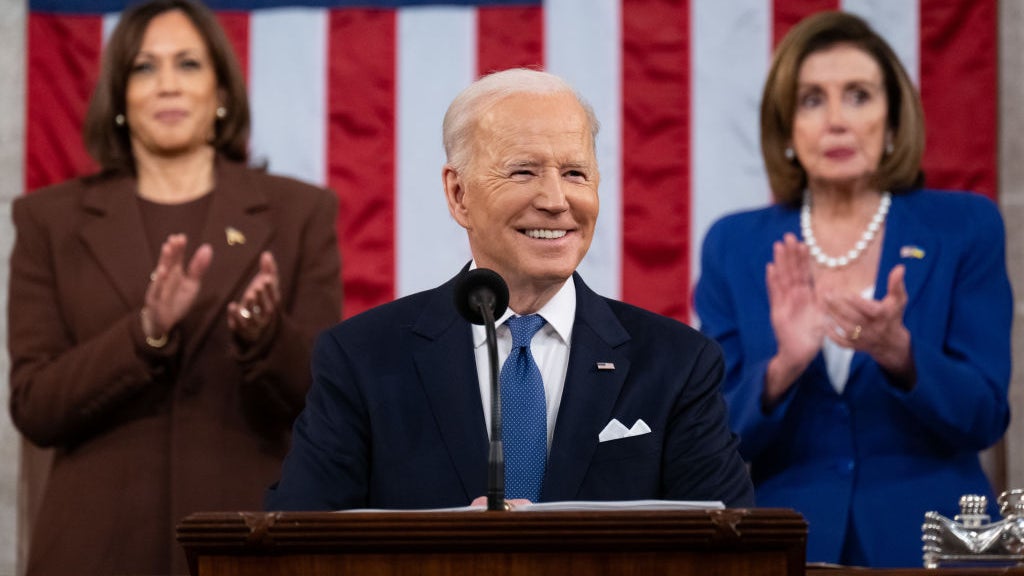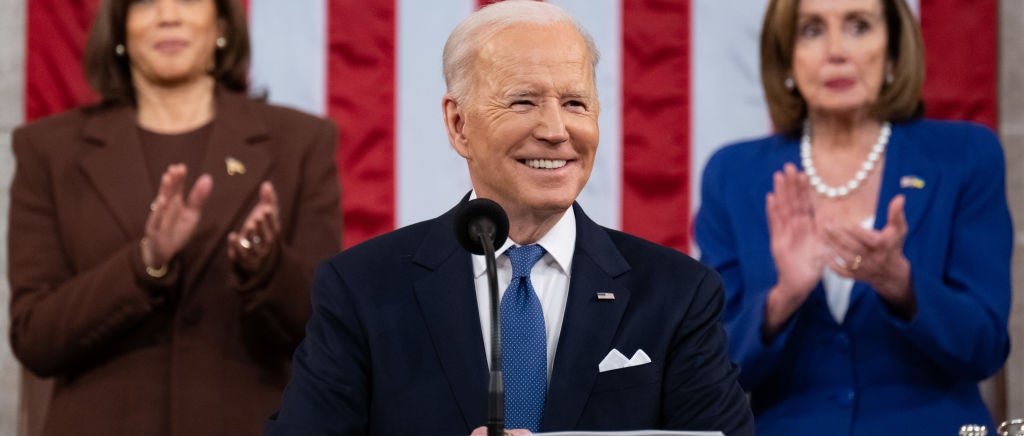There was barely a mask in sight at Tuesday night's State of the Union address, which marked a stark difference from the strict COVID-19 restrictions imposed on Capitol Hill since President Joe Biden took office.
President Joe Biden delivered his first State of the Union address Tuesday night following his first year in office. His speech was delivered amid continued struggles in the United States surrounding the battle against COVID-19, mounting tensions between Democrats and Republicans and increasing Russian aggression in their invasion of Ukraine.
Here are some takeaways from the night:
Vice President Kamala Harris and House Speaker Nancy Pelosi, Making History
For the first time in history, two women stood behind the President of the United States during the State of Union address – Harris, as the country’s first female vice president, and Pelosi, who has served as Speaker of the House since 2019.
Mask Mandates, or Lack Thereof
While most attendees of the State of the Union address skipped the masks in light of the latest mask-optional mandate on Capitol grounds, some members of Congress in attendance, however, opted to wear a mask anyway, including Senators Tammy Duckworth, John Ossoff and Ed Markey, and Representatives Jerry Nadler, Barbara Lee, Jim Cooper, Danny Davis and Jim Langevin, Politico reported.
Markey Tweeted that he would be wearing a mask as “the immunocompromised and those over 60 remain at higher risk of severe illness and hospitalization from COVID-19.”
This comes as the Capitol’s attending physician Dr. Brian Monahan announced just days earlier that masks will no longer be required for lawmakers in the House chamber.
"Individuals may choose to mask at any time, but it is no longer a requirement," Monahan said in a Sunday memo. He explained that the rate of positive tests at the Capitol’s testing site is down over the last two weeks, and the Washington D.C. region was now considered a low transmission area.
This comes as Democrats announced a new phase in the pandemic, with mask mandates being rolled back across the country both in public and at schools.
“Tonight, I can say we’re moving forward safely back to a more normal routine,” Biden said in his address.
All 535 members of Congress were also invited to attend this year’s address, following last year’s crowd size restrictions that led to only 200 members in attendance.
Support for Ukraine
Biden opened the speech by addressing the ongoing conflict in Ukraine, and encouraged both Democrats and Republicans to unite in opposition against Russia’s invasion.
"Stand and send an unmistakable signal to the world, to Ukraine. Bright, strong, resolved. We the United States of America stand with the Ukrainian people,” Biden said as both sides of the room applauded. “[Putin] thought he could roll into Ukraine and the world would roll over. Instead, he met with a wall of strength he never anticipated or imagined. He met the Ukrainian people,”
Ukrainian Ambassador to Washington Oksana Markarova was also in attendance of the State of the Union.
Commitment to Bipartisanship
While campaigning for president, Biden touted his commitment to unity and bipartisan support. That promise has been an uphill battle since he took office, with many moments of tension between the two parties in the face of various legislations including the voters rights bills.
But during the State of the Union, Biden seemed to reach across the aisle in renewing his commitment to unity. While acknowledging differences when it comes to major issues, he thanked his “Republican friends” at various moments in his speech, and called for unity in issues he views could be bipartisan, including the opioid crisis and what the future of COVID-19 looks like in the country.
Rep. Lauren Boebert’s Outburst and 'Build The Wall' Chant
Notably, Biden was faced with heckling at moments in his speech. While discussing health challenges against military members and veterans, including his late son Beau, who died at 46 from brain cancer, Boebart interjected, and appeared to blame Biden for the deaths of U.S. service members.
She and Rep. Marjorie Taylor Greene also appeared to start a “build the wall” chant while Biden discussed immigration reform, to other Republicans’ silence, and someone asking them to sit down.
Inflation Concerns and Funding the Police
Since the start of his presidency, Republicans have blamed Biden for mounting inflation in the country. Biden acknowledged the concerns and anxieties in his speech, saying, "Too many families are struggling to keep up with their bills. Inflation is robbing them of gains they thought otherwise they would be able to feel. I get it,” and later said getting prices under control is his “top priority.”
Republicans have also criticized some calls from liberal advocates to defund law enforcement agencies. Their calls for such a move have come after several high-profile police-involved shootings of people of color. Biden, however, said in his speech, “we should all agree the answer is not to defund the police. It’s to fund the police,” while addressing a spike in crime.







